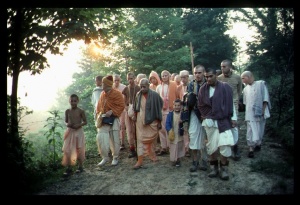CC Madhya 24.187 (1975): Difference between revisions
(Vanibot #0027: CCMirror - Mirror CC's 1996 edition to form a basis for 1975) |
(Vanibot #0020: VersionCompareLinker - added a link to the Version Compare feature) |
||
| Line 2: | Line 2: | ||
<div style="float:left">'''[[Sri Caitanya-caritamrta (1975)|Śrī Caitanya-caritāmṛta (1975)]] - [[CC Madhya (1975)|Madhya-līlā]] - [[CC Madhya 24 (1975)|Chapter 24: The Sixty-One Explanations of the Atmārāma Verse]]'''</div> | <div style="float:left">'''[[Sri Caitanya-caritamrta (1975)|Śrī Caitanya-caritāmṛta (1975)]] - [[CC Madhya (1975)|Madhya-līlā]] - [[CC Madhya 24 (1975)|Chapter 24: The Sixty-One Explanations of the Atmārāma Verse]]'''</div> | ||
<div style="float:right">[[File:Go-previous.png|link=CC Madhya 24.186 (1975)|Madhya-līlā 24.186]] '''[[CC Madhya 24.186 (1975)|Madhya-līlā 24.186]] - [[CC Madhya 24.188 (1975)|Madhya-līlā 24.188]]''' [[File:Go-next.png|link=CC Madhya 24.188 (1975)|Madhya-līlā 24.188]]</div> | <div style="float:right">[[File:Go-previous.png|link=CC Madhya 24.186 (1975)|Madhya-līlā 24.186]] '''[[CC Madhya 24.186 (1975)|Madhya-līlā 24.186]] - [[CC Madhya 24.188 (1975)|Madhya-līlā 24.188]]''' [[File:Go-next.png|link=CC Madhya 24.188 (1975)|Madhya-līlā 24.188]]</div> | ||
{{CompareVersions|CC|Madhya 24.187|CC 1975|CC 1996}} | |||
{{RandomImage}} | {{RandomImage}} | ||
==== TEXT 187 ==== | ==== TEXT 187 ==== | ||
<div class="verse"> | <div class="verse"> | ||
:buddhye rame | :buddhye rame ātmārāma--dui ta' prakāra | ||
: | :'paṇḍita' muni-gaṇa, nirgrantha 'mūrkha' āra | ||
</div> | </div> | ||
| Line 18: | Line 17: | ||
<div class="synonyms"> | <div class="synonyms"> | ||
buddhye—in intelligence; rame—who enjoys; ātmārāma—is | buddhye—in intelligence; rame—who enjoys; ātmārāma—is ātmārāma; dui ta ' prakāra—two varieties; paṇḍita—learned; muni-gaṇa—philosophers; nirgrantha—without education; mūrkha—foolish; āra—also. | ||
</div> | </div> | ||
| Line 25: | Line 24: | ||
<div class="translation"> | <div class="translation"> | ||
"Everyone has some kind of intelligence, and one who utilizes his intelligence is called ātmārāma. There are two types of ātmārāma. One is a learned scholar and a philosopher, and the other is an uneducated, illiterate and foolish person. | |||
</div> | </div> | ||
Latest revision as of 15:18, 27 January 2020
Śrī Caitanya-caritāmṛta (1975) - Madhya-līlā - Chapter 24: The Sixty-One Explanations of the Atmārāma Verse

His Divine Grace
A.C. Bhaktivedanta Swami Prabhupada
A.C. Bhaktivedanta Swami Prabhupada
TEXT 187
- buddhye rame ātmārāma--dui ta' prakāra
- 'paṇḍita' muni-gaṇa, nirgrantha 'mūrkha' āra
SYNONYMS
buddhye—in intelligence; rame—who enjoys; ātmārāma—is ātmārāma; dui ta ' prakāra—two varieties; paṇḍita—learned; muni-gaṇa—philosophers; nirgrantha—without education; mūrkha—foolish; āra—also.
TRANSLATION
"Everyone has some kind of intelligence, and one who utilizes his intelligence is called ātmārāma. There are two types of ātmārāma. One is a learned scholar and a philosopher, and the other is an uneducated, illiterate and foolish person.